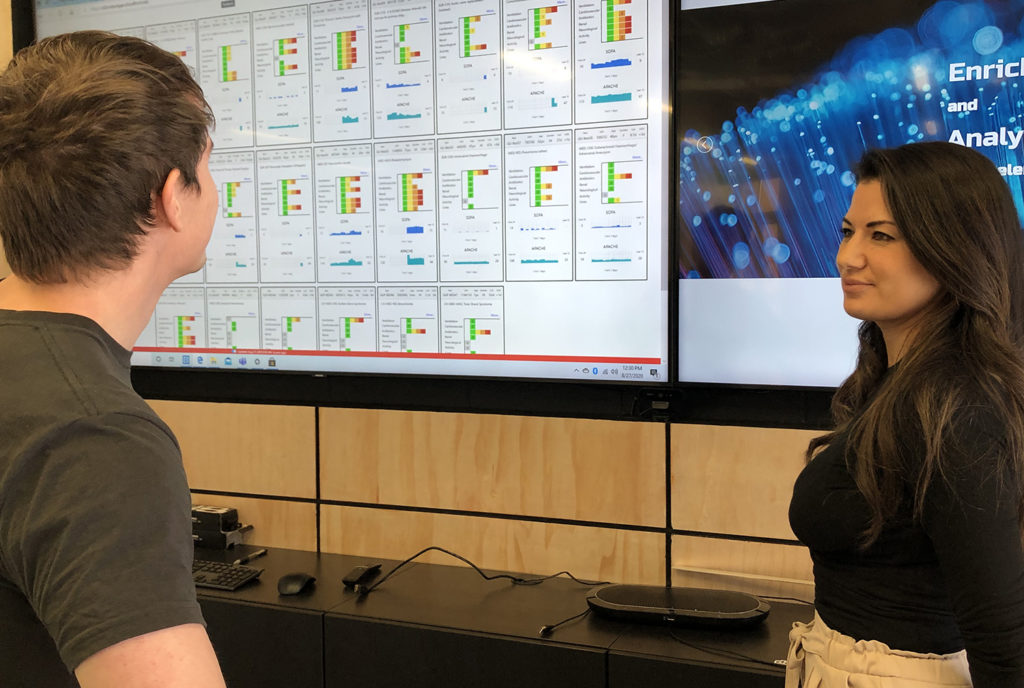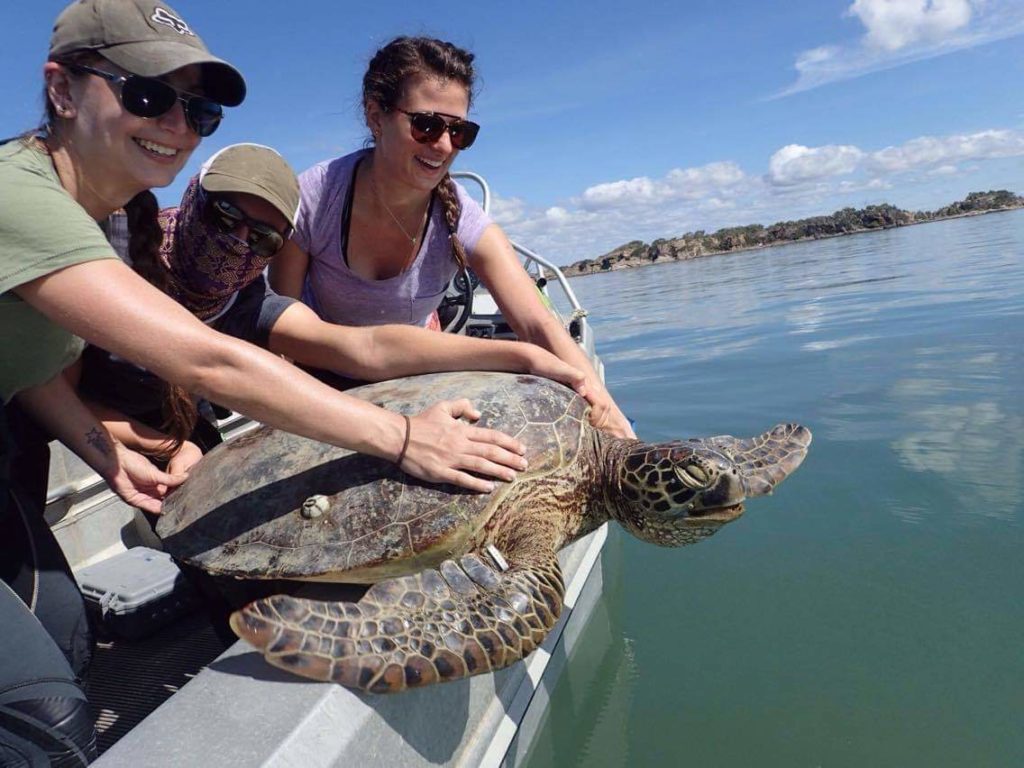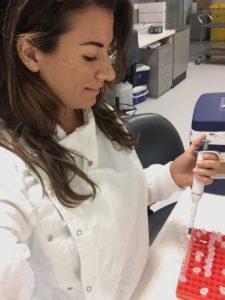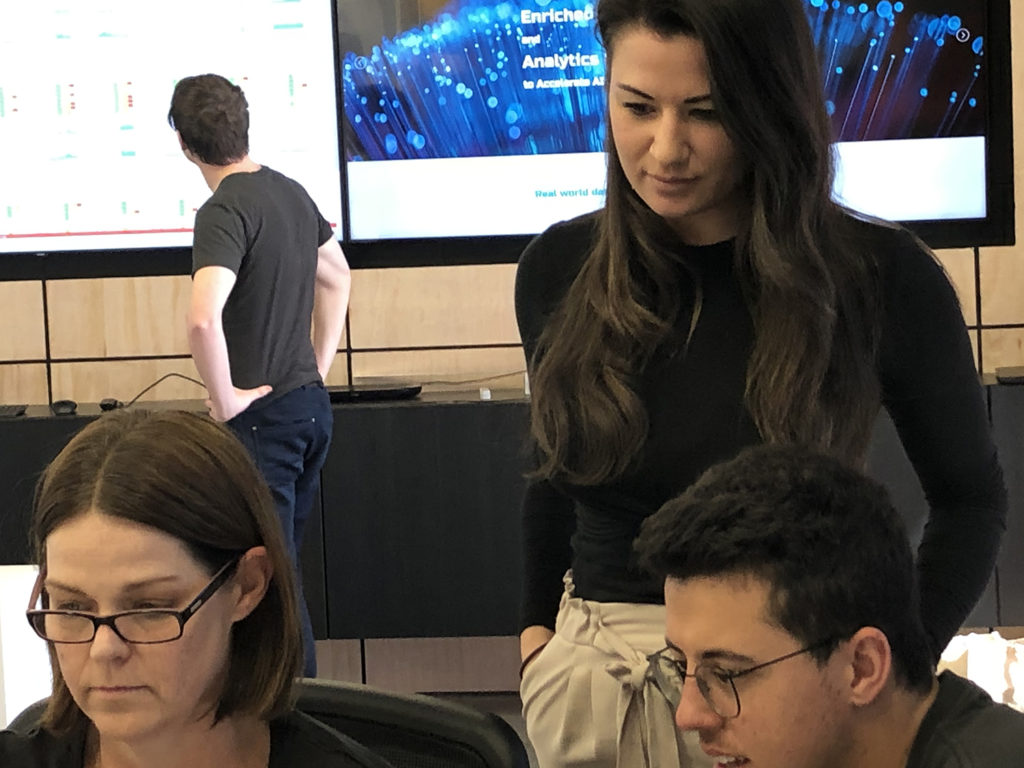
With technology company Datarwe opening its doors to a new DataScience lab within Cohort in the Gold Coast Health and Knowledge Precinct, it can accelerate development of its Precision Medicine Data Platform (PDMP), a world-leading comprehensive acute care medical research platform – providing a major new resource to develop AI enabled diagnostics, treatment protocols and med-tech products in Queensland.
Driving partnerships and engagement, including a major partnership with Griffith University, is former alumnus Dr Stephanie Chaousis, an Ecotoxicology PhD whose own research saw her wading through a sea of data to develop a keen appreciation for the potential of AI and machine learning.
When Stephanie Chaousis undertook her undergraduate marine and molecular science studies at James Cook University, before completing post-graduate honours exploring therapeutic effects of jellyfish venom at the Australian Institute of Tropical Health and Medicine in 2012, the opportunities presented by the next-generation of artificial intelligence (AI) may still have seemed oceans away, for novice researchers like herself.
Only eight years ago the potential of AI and machine learning for researchers, industry and indeed the whole world, was being rapidly developed in university computer science labs, tech companies and major corporations, but the ripple effect on research in other scientific fields was still to be fully felt.
Steph’s jellyfish project called for separating out multiple different molecules to determine which were lethal and which weren’t, in the hunt for those that might prove therapeutic – painstaking laboratory analysis performed without the help of a handy predictive algorithm.
After a short segue at the University of Queensland’s Institute for Molecular Bioscience, probing therapeutic opportunities in Tarantula venom, Steph embarked on a PhD at Griffith University in 2015, in a bid to discover a protein biomarker for exposure to chemical pollution from the cell and blood samples of sea turtles.
By the time she was completing her final thesis to earn her doctorate and play her part in marine conservation, she had some 200,000 data points to work with, and was convinced of the opportunity that AI presents in an increasingly ‘big data’ world.

“When you have too much data it becomes more challenging to derive meaning, so I got really interested in AI and machine learning from that point.”
Having worked in both lab and teaching assistant roles at Griffith throughout her PhD studies, Steph proved her versatility by finding a position as an Environmental Scientist for the City of Gold Coast’s Water and Waste directorate, while simultaneously interning with Griffith’s Institute for Glycomics as a Business Analyst.
She’d previously connected with Datarwe CTO Dr Kelvin Ross at a Cohort event, and kept in touch, so he came knocking when the fast-growing company needed an energetic exponent of Data Science and AI, who could build collaboration with researchers in industry, academia and healthcare.

“It’s really exciting to be working with Datarwe from such an early stage and being a part of the company’s growth. Being in this space has offered up great opportunities such as developing and overseeing the MedTech Program for the new Queensland AI Hub, which is a dual role I’m currently in,” Steph says.
“What’s exciting about AI is that it can provide us with accurate prediction using insights from the medical data we already have access to – so rather than relying on future studies and trials, we can look retrospectively for clues and answers. But in order to extract this meaning, the data needs to be useable, accessible, accurate and secure, which is what we are doing at Datarwe by building the PMDP.”

Datarwe’s PDMP, which earlier this year received $1.5 million funding from Advance Queensland, works by collecting de-identified patient data from hospital Intensive Care Units’ monitoring devices and clinical notes. The data is securely enriched so it can be used by developers to create tools using AI and ML to develop predictive analytics, which then help health care professionals make timely decisions at the patient’s bedside.
It’s a potentially life-saving platform, especially in the midst of a pandemic, and Steph was eager to inspire innovation, as chair of the inaugural Queensland AI Hub Medical Datathon, held in virtual mode in July.
Staged over two weekends, the event brought together multidisciplinary teams with expertise in data science, ML and AI, with clinicians and medical researchers, as well as the business and student communities, to work with real-world data on new medical applications. The impact has extended well beyond, with many teams continuing to develop their projects to make waves in the world of AI – read more.
“Overall, the last 6 months working at Datarwe and the AI Hub has opened my eyes to the appetite in Queensland, and particularly the Gold Coast, for the kind of advanced technology we are building at Datarwe and supporting through the Hub.
As I have personally experienced, the job opportunities in this space are growing rapidly right here in the GCHKP and Lumina, and I’m glad to be able to support the growth of this important industry for Queensland.”
Connect with Steph![]()